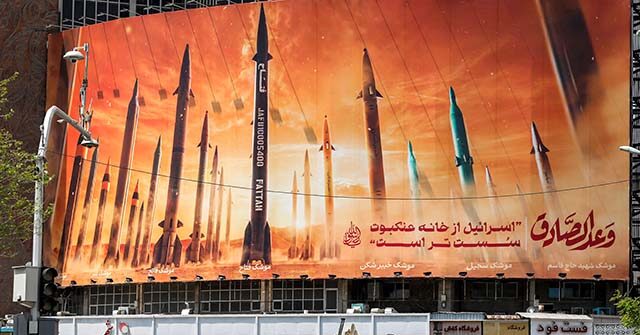Maj. Gen. Yahya Rahim-Safavi, senior military adviser to Iranian Supreme Leader Ayatollah Ali Khamenei, on Monday claimed Iran was capable of far more devastating retaliatory strikes against the U.S. and Israel than it has been able to launch thus far, and Iran is ready to attack targets beyond the Middle East if necessary.
“Should they begin a new round [of aggression], Iran will start a new round [of retaliation] that will exceed their expectations,” Rahim-Safavi threatened on Monday, as transcribed by Iran’s state-run PressTV.
The general claimed Iran knows the “interests, structures, bases, and forces” of its enemies across the Middle East, clearly alluding to the sort of terror attacks Iran’s proxies in Iraq used to routinely launch against bases housing American troops.
“The power of the IRGC extends beyond the region,” he said, claiming Iran still has a vast arsenal of “thousands” of ballistic missiles aimed at American and Israeli targets.
The IRGC is the Islamic Revolutionary Guard Corps, the theocracy-controlled wing of the Iranian military, which takes a leading role in both terrorist operations on foreign soil and brutal suppression of the Iranian people.
“With my over 40 years of experience confronting the enemies, I confidently state that victory will ultimately belong to the great and powerful Iranian nation, and defeat will befall the Great Satan and the Lesser Satan,” Rahim-Safavi exclaimed.
According to the Supreme Leader’s military adviser, the Lesser Satan will not be around for much longer. Rahim-Safavi hallucinated the Israelis were roundly defeated in the recent 12-Day War thanks to the brilliant military leadership of Ayatollah Khamenei, who predicted in 2015 that Israel would “not exist” in 25 years.
“The Zionist regime and Netanyahu’s demise have drawn near,” he said.
Rahim-Safavi’s huffing and puffing was par for the course with Iran, which was in truth humiliated by the Israeli military during the 12-Day War. Iran was only able to retaliate by wantonly firing missiles at civilian targets in Israel and, after the U.S. concluded the war by bombing Iran’s uranium enrichment sites, Tehran very carefully launched a symbolic six missiles at a largely abandoned base in Qatar that once housed American troops.
Fatemeh Mohajerani, a spokeswoman for Iranian President Masoud Pezeshkian, likewise claimed on Tuesday that Iran has vast military strike capability hidden away somewhere and is ready to unleash it upon Israel and the United States if they ever harm Ayatollah Khamenei.
Israeli President Benjamin Netanyahu said during the war that “no one is immune” to airstrikes, including Khamenei, although he refused to discuss whether Israeli forces had drawn up plans to eliminate the ayatollah.
President Donald Trump said last Friday that he saved Khamenei from “a very ugly and ignominious death” by convincing the Israelis not to kill him, and suggested it would be nice if the ayatollah thanked him for doing so. This seems to have enraged the Iranians even more than Netanyahu describing Khamenei as a legitimate target.
Mohajerani confirmed that Iran’s uranium enrichment sites were “seriously damaged” by U.S. airstrikes. She said the regime has not yet decided if it will resume nuclear negotiations with the United States, but it was unlikely any such talks would resume soon.
The editors of The National on Monday expressed frustration that the extent of the damage to Iran’s nuclear program was so difficult to determine.
Although Mohajerani spoke of “serious” damage, other Iranian officials have claimed the damage was “minimal.” President Donald Trump claimed Iran’s uranium enrichment program was “totally obliterated” by the strikes he ordered, while International Atomic Energy Agency (IAEA) director Rafael Grossi has said Iran could resume enriching uranium at some reduced capacity in a “matter of months.”
Like Grossi, The National’s editors insisted the only way to resolve the situation was to get Iran back to the negotiating table – and, like Grossi, the editors preferred not to dwell on the value of negotiations with a regime as given to secrecy and false statements as the Islamic Republic of Iran.
“For diplomacy to succeed, there must be a shared baseline of facts. In the current climate, both sides seem more interested in bluster and posturing than they do in transparency and good-faith talks. In this context, any attempt to revive negotiations risks being built wasted,” they complained.
The status of Iran’s non-nuclear ballistic missile inventory is also a matter of concern. Officials like Gen. Rahim-Safavi have an interest in pretending Iran expended very little of its strength on striking Israel, whose multi-layered missile defense system was able to intercept many, but not all, of Iran’s weapons.
The Israel Defense Forces (IDF) claim to have destroyed hundreds of Iran’s missiles on the ground, along with up to half of its medium-range ballistic missile launchers. Iran launched up to 550 missiles at Israel during the 12-Day War. Iran also expended hundreds of missiles attacking Israel twice in 2024 during the Gaza War.
The U.S. military estimated Iran had about 3,000 missiles in its stockpile before the Gaza war began, including a large number of short-range weapons that could not reach targets in Israel. If that estimate is accurate, more than half of Iran’s medium-range ballistic inventory may have been launched or destroyed on the ground, along with a fair number of its drones.
Read the full article here


